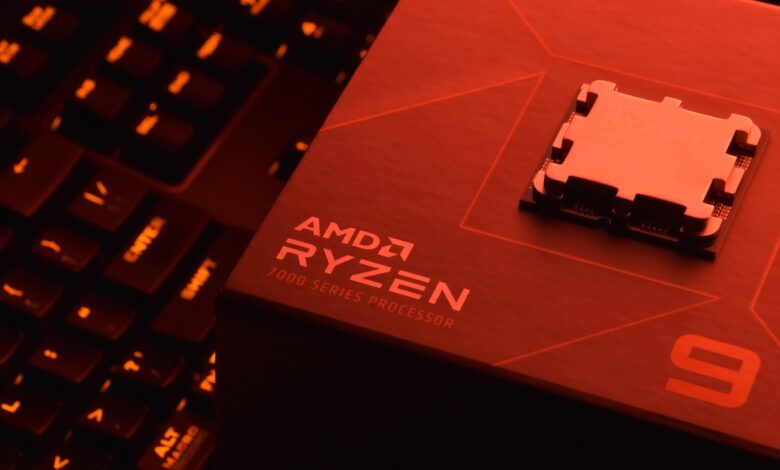AMD Bets Big on AI, Unveils New Chips to Power Copilot

The artificial intelligence chip race is heating up. In a bid to outpace rivals Nvidia and Intel, AMD unveiled a suite of cutting-edge AI chips at the Computex tech conference in Taipei Monday (June 3)
CEO Lisa Su declared AI the company’s “No. 1 priority,” emphasizing the technology’s transformative potential across industries.
The star of the show was the Ryzen AI 300 series, designed for next-gen AI laptops and poised to challenge Intel’s Lunar Lake and Qualcomm’s Snapdragon X head-on. In a strategic partnership with Microsoft, these chips will power laptops featuring the tech giant’s AI chatbot, Copilot.
“AI is our No. 1 priority, and we’re at the beginning of an incredibly exciting time for the industry as AI transforms virtually every business, improves our quality of life, and reshapes every part of the computing market,” Su declared during her keynote.
Need for Speed
Not content with just the AI arena, AMD also unveiled the Ryzen 9000 series for desktops, touting them as “the world’s fastest consumer desktop processors” tailored for gaming and content creation. Both the Ryzen AI 300 and Ryzen 9000 are set to hit shelves in July, hot on the heels of the company’s recent Ryzen Pro 8040 and 8000 processors, which can run AI workloads.
At Computex, AMD’s ecosystem partners demonstrated their collaborative efforts to harness the potential of AI in personal computing. Microsoft, a long-time AMD partner, confirmed that the AMD Ryzen AI 300 Series processors surpass the requirements for Microsoft’s Copilot+ PC initiative. HP introduced new Copilot+ PCs powered by AMD, such as the HP Pavilion Aero, and showcased the Stable Diffusion XL Turbo image generator running natively on an HP laptop equipped with a Ryzen AI 300 Series processor.
Lenovo announced upcoming consumer and commercial laptops featuring Ryzen AI 300 Series processors and discussed how it uses Ryzen AI to enable new Lenovo AI software solutions. Asus displayed a diverse range of AI PCs targeting various user segments, including business users, consumers, content creators and gamers, all powered by Ryzen AI 300 Series processors.
“We are in the midst of a massive AI platform shift, with the promise to transform how we live and work,” Microsoft Chairman and CEO Satya Nadella said in a news release. “That’s why our deep partnership with AMD, which has spanned multiple computing platforms, from the PC to custom silicon for Xbox, and now to AI, is so important to us. We are excited to partner with AMD to deliver these new Ryzen AI-powered Copilot+ PCs. We are very committed to our collaboration with AMD, and we’ll continue to push AI progress forward together across the cloud and edge to bring new value to our joint customers.”
Looking beyond consumer electronics, AMD detailed a data center chip roadmap. The Instinct MI325X accelerators, an enhanced version of the MI300 series, are slated to be available in the fourth quarter, while the next-gen Instinct MI350 and MI400 series are planned for 2025 and 2026, respectively. Su also teased the fifth-generation EPYC server processors, due in the latter half of this year, promising to “continue the leadership performance and efficiency of the AMD EPYC processor family.”
Foundry Finesse
Like rival Nvidia, AMD relies on outsourced chip manufacturing, primarily through Taiwan Semiconductor Manufacturing Company, the world’s largest contract chipmaker. The Ryzen AI 300, Ryzen 9000, and fifth-gen EPYC chips will all be built on new “Zen 5” architecture.
“You’re going to see Zen 5 everywhere, from supercomputers to data centers and PCs,” Su predicted.
The high-stakes race among chip manufacturers to deliver faster, more powerful AI processors shows no signs of slowing. According to experts cited by PYMNTS, Nvidia’s latest B200 GPU chip, which has 208 billion transistors and delivers up to 20 petaflops of FP4 processing power, could revolutionize the commerce industry by enabling faster and more efficient AI applications.
With Nvidia and Intel also making moves, AMD’s success hinges on its ability to deliver on performance promises and forge strategic partnerships in a rapidly evolving tech landscape.
As Su noted, “We’re at the beginning of an incredibly exciting time for the industry.”
The question remains: Who will emerge as the dominant force in the AI chip market?
For all PYMNTS AI coverage, subscribe to the daily AI Newsletter.



